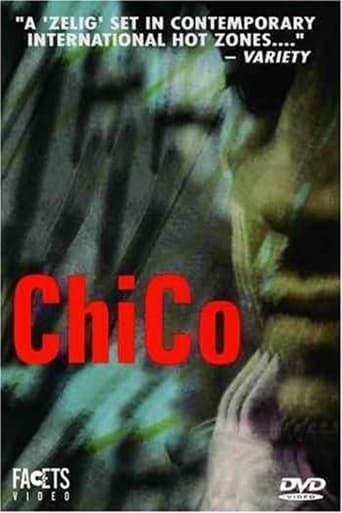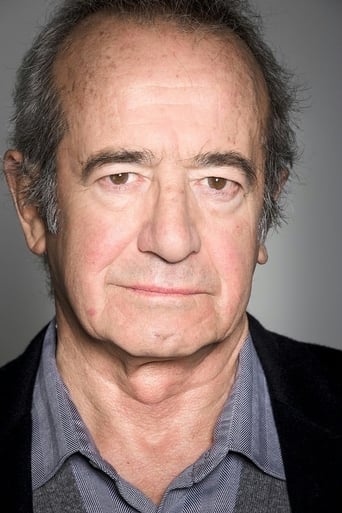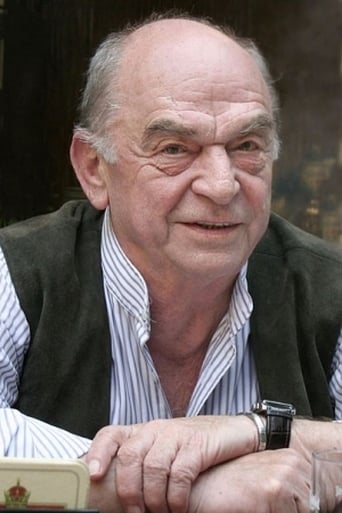Chico (2001)
The adventures of a young man as he moves from the Latin-American revolutions in the sixties and seventies, through Hungary in the eighties, to the Croatian war in 1991.
Watch Trailer
Free Trial Channels
Cast


Reviews
Pretty Good
I gave it a 7.5 out of 10
Fantastic!
This is a dark and sometimes deeply uncomfortable drama
This is a semi fictional memoir of an "international man" who have witnessed various political upheavals in recent 30 years.I was hoping that this film would offer unique insight into politics and war. I was also hoping that it would be touching and affecting. However, I was disappointed by this film. "Chico" seemed fragmentary, with the main character, Ricardo, staying in one country for 10 to 20 minutes. As could be expected, no detailed storyline could be elaborated in such time frame. The excuses of him moving to another place were often perfunctorily explained. The result was a disappointing collection of fragmented clips shot in various countries.
I'm not sure a more challenging film has been made. Fekete, director of Bolshe Vita, itself a complex and difficult undertaking, went beyond what we think of as manageable material with Chico. Blurring fact and fiction, uniting a story told through 25 years in 5 nations, or almost-nations, or nations in the process of becoming, unified by the improbable story of an impossible man whose credibility lies in the fact that he is portraying himself, masterfully, honestly, fragmentarily. This is a film of genius by a filmmaker who is not satisfied unless she is on the trail of something very large, very real -- the only other filmmakers I can think of that approach this are the early Rossellini and the early Cassavetes. I would welcome further information on this director and how she managed to make this film.
At the outset I'll say I love films with some basis in historical events. The problem is of course that the more a film commits itself to historical events the more a review tends to refer to those events rather than the film.Firstly, what I like about this film is that it doesn't try to appease any group or be politically correct. It doesn't go for the soft option as many other recent movies about recent wars do,ie: there is no good or bad, both side commit atrocities. Such liberal soppiness is misleading and directly opposed to historical fact and common sense. There are aggressors and there are victims, even though the lines of demarcation are occasionally blurred. This film in a way refers back to the films of commitment made in the 1930s in Hollywood or Latin America in the 1960s.Similarly, people usually re-write history to suit their worldview. I note that another reviewer blamed the Yugoslav War on US and German imperialism and that the "poor" Serbians, Croatians and Bosnians were their pawns that had lived "peacefully and admirably until the West engineered the collapse of Yugoslavia". What planet did that come from? The Croatians and the Serbians have not got on in since the turn of the 20th century (as World War 1 and 2 show). Yugoslavia ( both pure and post WW2) was very much held together by force and intimidation. That's a historical fact. If the various ethnic groupings had "got on" the force of violence that erupted in the Yugoslavian War would not have occurred. That's common sense. I assume such views are based on ones internal beliefs. In this case its standard old style claptrap leftism (which unfortunately gives leftism a bad name).History is written by the victors and in Yugoslavia after 1944 the Serbians (once again) took control of the country. Their history, which was passed out as historical fact for the next 50 years, was, they were leftists and the Croatians were all fascists, therefore you should support us in this war. The reality of course is that the Yugoslav army and irregulars in the recent war were dominated by Serbian nationalists seeking a greater Serbia and using ethnic cleansing and murder as a means to achieve this, not to mention the fact that during World War 2 (up to 1944 in any event) most of the Communist Partizans were in fact Croatian.The beauty of course is the film is attempting to overcome the conventionally held history. It doesn't deal with past history though, but rather with what is happening now. By dealing with "history now" the film sheds light on some of the lies that have been passed out as historical fact.The central character Chico is a man of contradictions. A child of a Hungarian Jewish father and a Spanish Catholic mother he is a child of the 1960s Latin revolutions and raised in a leftist family. So he is a Communist but a practicing Catholic, he goes to a Catholic priest for confession but prays at the weeping wall, he is a humanist but advocates war.These supposed contradictions always existed within people. People are molded from many historical events and social forces surrounding them. The only place pure ideologies exist are in philosophical arguments between half smart raconteurs or in undergrad university assignments . ie: you cant believe in that if you believe in that etc. This film never backs away from commitment but it does subtlety (and sometimes not so subtlety) suggest that there is another side. Accordingly, you don't get the feeling you are being preached at (whereas you might from this review).The film takes you on Chico's journey through causes around the world like a frenzied 20th century Don Quixote looking for meaning. Chico's humanity ultimately leads him to Yugoslavia and the Croatian Homeland War in the 1990s. And even though it is not a ideologically correct war (as his father tells him) he knows within himself that he must side with the oppressed.Chico searches and is redeemed but is he content, or is he saddened and scarred? At times it seems that Chico, like a Zelig, was at all the important late 20th century events, and the film seems to make comment on them. On that level the film is not always successful (its hard enough commenting on one situation). The film is more successful as a personal odyssey through tumultuous events.There are some standard Hollywood war movie clichés, ie: the outnumbered and besieged forces, the sing a long etc but, but they are downplayed, and I sometimes wonder if clichés became clichés because they actually occurred in times of war. What underpins the whole film though is the upfront, "in your face" reality of it all ... like Sam Fuller with a hand-held camera. The photography is not pretty, which suits the picture perfectly although I wouldn't have minded a few more scene setting shots. The docu-drama works well at drawing you into the story whilst distracting you from the budgetary limitations of the film. The "docu" is the newsreel footage of the war whilst the "drama" is Chico's journey (both physically and spiritually) and people he meets on the way. This is a war film that deals with people rather than action there is little action and when it does come it is over quickly.The acting is fine, and Eduardo Rozsa Flores plays Chico effortlessly, not surprisingly as Chico is based on Flores own life in part! Flores fought, globe trotted and eventually found a cause in the Croatian Homeland War. The direction ( by Ibolya Fekete) is handled nicely and the action is gritty. The real stand out though is the directors juxtaposition (you have to love that word even if it is overused) of live action with news footage.If you want to be confronted and challenged ... watch this.
Wow, loved it, a celebration of the struggle not the ideology. Wonderfully complex.Having lived through a dictatorship and having participated in a revolution I appreciate the cold reality and lack of romanticization in the film. Life is hard and definitely not romantic when you are in the trenches fighting a superiour enemy. But life is not miserable, I found the other side of war the humour, the laughter and the absurdity a bit scarce in this film. Well the absurdity did come through.I found the film complicated, like life, the way it should be. The film was never preachy, quite a feat considering the intensity with which Chico embraced life according to his principles. I liked Chico even when I didn't agree with him, the depiction of Yugoslavia and the Croatian struggle within it, was moving but very much lacking in perspective; choices are difficult when one's feet are in the fire, and perspective comes with time and distance. Yugoslavia was the real victim, the US and Germany were the real criminals, and the poor Serbians, Croatians and Bosnians were very much the pawns. Pawns that had lived peacefully and admirably until the West engineered the economic collapse of Yugoslavia. The references to Che Guevara's book "Guerrilla Warfare" which so influenced Chico's character might be completely lost in todays generation and on a North American audience. But it would be great for people to see this film and be exposed to a perspective not doctored by the corporate media and the pentagon, to get a real feeling about the complexities of war. A must see film. A great story.








